Chicago Board of Education meeting held on August 24, 2011 approves major policy changes, controversial $5.9 billion budget for 2011 - 2012 school year
On Wednesday, August 24, 2011, at the regular monthly meeting of the Chicago Public Schools (CPS) Board of Education (BOE), at 125 S. Clark Street, in the Board chambers on the fifth floor, which was scheduled to begin at 10:30 a.m., only forty persons were signed up to speak during public participation (compared to 101 on January 26, 2011). 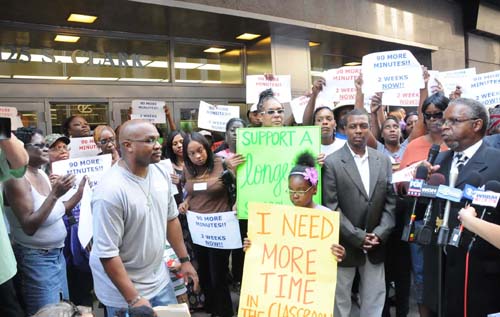 One day before the CPS "Office of Faith Based Initiatives" treated them to breakfast at U.S. Cellular Field, several clerics from Chicago's African American community mobilized people to protest against Chicago's supposedly short school day and support Mayor Rahm Emanuel's attack on the Chicago Teachers Union contract in a demonstration and media event prior to the August 24, 2011 Chicago Board of Education meeting. Substance photo by George N. Schmidt.By the time policy presentations were completed by BOE staff members and questions by Board members were answered, it was approximately noon. By then, several of those forty members of the public did not speak because they had left by the time their names were called.
One day before the CPS "Office of Faith Based Initiatives" treated them to breakfast at U.S. Cellular Field, several clerics from Chicago's African American community mobilized people to protest against Chicago's supposedly short school day and support Mayor Rahm Emanuel's attack on the Chicago Teachers Union contract in a demonstration and media event prior to the August 24, 2011 Chicago Board of Education meeting. Substance photo by George N. Schmidt.By the time policy presentations were completed by BOE staff members and questions by Board members were answered, it was approximately noon. By then, several of those forty members of the public did not speak because they had left by the time their names were called.
Policy presentations included High School Athletic Association by-laws, Magnet and Selective Enrollment Policy and the Budget.
Calvin Davis, Director of Sports Admission, was here last month to speak about the concussion policy. This month, amendments to the High School Athletic Association by-laws were presented. It was recommended that football helmets be inspected every year and reconditioned every two years. Procedures for background checks on coaches was rewritten. The Director will be allowed discretion in deciding on suspensions of coaching violations. The concussion policy must be completed by all coaches. A copy of the proposed rules was included in the public agenda distributed prior to the Board meeting (and later passed by a vote of the Board).
Davis mentioned that the newest sports in CPS are LaCrosse and Bass Fishing, and that chess is now being considered an year-round activity rather than a seasonal sport.
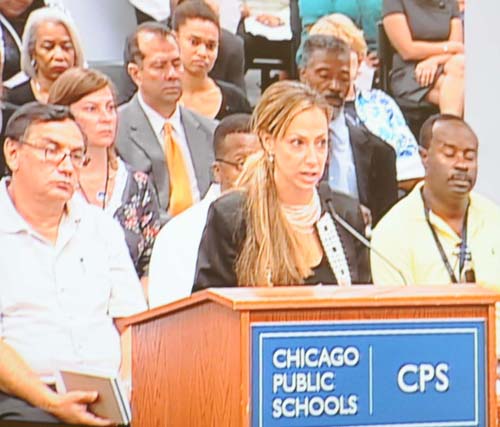 As the Power Point presentation, narrative, and question-and-answer from Board members went on, even the well-trained CPS staff members who are assigned to seats in camera range at the Board meeting began showing signs of fatigue. The presentation, by CPS's chief of "Academic Enhancement" Abigayil Leah Joseph (above, at podium) took up nearly a half hour and pushed back the public participation portion of the meeting so much that more than a dozen people who had signed up to speak were gone by the time their names were called. Substance photo by George N. Schmidt.Next, Abigayil Leah Joseph, who heads "Academic Enhancement," spoke about the newly proposed (and revised) Magnet and Selective Enrollment Policy, which was instituted in response to the Desegregation Consent Decree in effect from 1980 to 2009 and changed following a Supreme Court decision regarding race-based assignments in 2009. In the future, instead of having a new Magnet and Selective Enrollment Policy every year, a multi-year policy with no end date will be put into effect. A "Blue Ribbon Commission" met and decided to keep some of the old provisions and adopt new ones. Public hearings were held. Recommendations were made.
As the Power Point presentation, narrative, and question-and-answer from Board members went on, even the well-trained CPS staff members who are assigned to seats in camera range at the Board meeting began showing signs of fatigue. The presentation, by CPS's chief of "Academic Enhancement" Abigayil Leah Joseph (above, at podium) took up nearly a half hour and pushed back the public participation portion of the meeting so much that more than a dozen people who had signed up to speak were gone by the time their names were called. Substance photo by George N. Schmidt.Next, Abigayil Leah Joseph, who heads "Academic Enhancement," spoke about the newly proposed (and revised) Magnet and Selective Enrollment Policy, which was instituted in response to the Desegregation Consent Decree in effect from 1980 to 2009 and changed following a Supreme Court decision regarding race-based assignments in 2009. In the future, instead of having a new Magnet and Selective Enrollment Policy every year, a multi-year policy with no end date will be put into effect. A "Blue Ribbon Commission" met and decided to keep some of the old provisions and adopt new ones. Public hearings were held. Recommendations were made.
The complete policy was summarized in Power Point during the Board meeting and published in the agenda for August 24, 2011. (It was approved by a vote of the Board later that day). Some of the recommendations were that principal discretion not be reinstated, the transfer program from the lowest performing elementary schools would be maintained, siblings of already enrolled students would still be admitted, seats would not be saved for students who leave but want to return later and children of teachers who taught in magnet schools would not be automatically enrolled in the schools where their parents taught.
Both the detailed presentation and Joseph's answers to questions from several Board members showed the importance of the topic and the controversies that still exist. (Later in the Board meeting an elementary principal objected to the banning of the admission of children of teachers, an example of the kinds of controversies the Board may face in the months ahead).
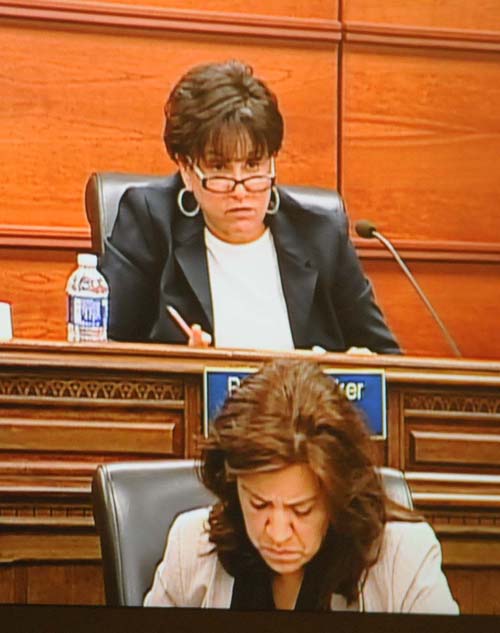 The only skeptical questions about the Board's proposed budget came from Board member Penny Pritzker (above, rear) who asked Cawley why the CPS debt had increased so much recently. Despite efforts by CPS officials to focus all of the attention on what it calls the "long term sustainability problems" of CPS on the obligations to the Chicago Teachers Pension Fund, the spending spree on politically connected construction has fueled the long-term problems facing CPS much more than the ongoing legal obligations that CPS pays its share of the teacher pensions just as the teachers have been dong for more than 110 years. Whether the Board will investigate the enormous cost overruns on construction projects (which often amount to 100 percent over the bid price) remains to be seen. Substance photo by George N. Schmidt.Next the fiscal 2012 Budget was discussed. Four hundred million dollars in Central Office cuts were made, according to the presentation and narrative by the "Chief Administrative Officer" Tim Cawley. Chief Executive Officer (CEO) J.C. Brizard said that he is pushing for a "richer, fuller school day" and told the Board members that he had "proposed" on August 23 to the Chicago Teachers Union (CTU) that increases in the school day be instituted this year. [Brizard didn't mention the fact that his "proposal" had been made on the TV show Chicago Tonight, a point made later during the Board meeting by Chicago Teachers Union President Karen Lewis, who told the press she doesn't negotiate with the Board on behalf of the union's 30,000 members on public television].
The only skeptical questions about the Board's proposed budget came from Board member Penny Pritzker (above, rear) who asked Cawley why the CPS debt had increased so much recently. Despite efforts by CPS officials to focus all of the attention on what it calls the "long term sustainability problems" of CPS on the obligations to the Chicago Teachers Pension Fund, the spending spree on politically connected construction has fueled the long-term problems facing CPS much more than the ongoing legal obligations that CPS pays its share of the teacher pensions just as the teachers have been dong for more than 110 years. Whether the Board will investigate the enormous cost overruns on construction projects (which often amount to 100 percent over the bid price) remains to be seen. Substance photo by George N. Schmidt.Next the fiscal 2012 Budget was discussed. Four hundred million dollars in Central Office cuts were made, according to the presentation and narrative by the "Chief Administrative Officer" Tim Cawley. Chief Executive Officer (CEO) J.C. Brizard said that he is pushing for a "richer, fuller school day" and told the Board members that he had "proposed" on August 23 to the Chicago Teachers Union (CTU) that increases in the school day be instituted this year. [Brizard didn't mention the fact that his "proposal" had been made on the TV show Chicago Tonight, a point made later during the Board meeting by Chicago Teachers Union President Karen Lewis, who told the press she doesn't negotiate with the Board on behalf of the union's 30,000 members on public television].
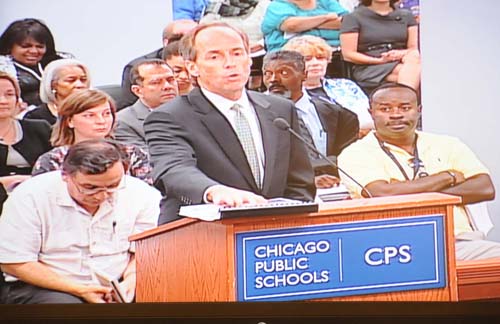 CPS "Chief Administrative Officer" Tim Cawley (above at podium) held one of the few printed copies of the CPS budget under his right hand during his presentation to the Board of Education's August 24 meeting. Cawley told the Board that public hearings had been held, but failed to mention that for the first time in history the Board had refused to print copies of the Proposed Budget for distribution to the public prior to the hearings. Cawley also ignored the fact that transcripts of the hearings had not been made available prior to the August 24 Board meeting, and since only one Board member had attended the hearings, the Board members had no idea of what the more than 600 people who had attended the hearings said or felt about the Proposed Budget. The Proposed Budget, which in total came to more than 2,000 pages, had been "published" on line, but not distributed to libraries, ward offices, and from CPS headquarters as had been done for more than 150 years before Mayor Rahm Emanuel took office in 2011. Substance photo by George N. Schmidt.Tim Cawley, the Chief Administrative Officer, was praised by Brizard for having done amazing work in only 11 weeks. Prior to his appointment to his new job, Cawley worked for the "Academy for Urban School Leadership" (AUSL), which was doing "turnaround" until the name was changed to "transformation." Cawley then spoke at length, using Power Point, to detail the CPS version of where the Board's $5.9 billion budget stood. He spoke of the three public budget hearings that were held on the North, West, and South sides. Cawley said (teacher) salaries would not be increased by four percent this school year because of what he says are tough financial times. Reserves would be tapped into approximately matching the shortfall. During his slide show, he said that the following items were proposed in order to save money in the budget: eliminate the step and lane increases that teachers and other school staff currently receive, make downward adjustments in health-care, pensions, sick-day pay-outs and discontinue charter schools that are not getting results. According to Cawley, most of those were rejected, although he reminded the Board members that CPS has refused to honor the fifth year of the union contracts (there are seven unions which are supposed to get the final four percent raise in the 2011 - 2012 school year under a five-year contract signed in August 2007), claiming it couldn't afford it. (Cawley wasn't asked to explain how Brizard had found the money to offer what he claimed was a "two percent" raise for elementary teachers, which Brizard had announced the night before on a TV show).
CPS "Chief Administrative Officer" Tim Cawley (above at podium) held one of the few printed copies of the CPS budget under his right hand during his presentation to the Board of Education's August 24 meeting. Cawley told the Board that public hearings had been held, but failed to mention that for the first time in history the Board had refused to print copies of the Proposed Budget for distribution to the public prior to the hearings. Cawley also ignored the fact that transcripts of the hearings had not been made available prior to the August 24 Board meeting, and since only one Board member had attended the hearings, the Board members had no idea of what the more than 600 people who had attended the hearings said or felt about the Proposed Budget. The Proposed Budget, which in total came to more than 2,000 pages, had been "published" on line, but not distributed to libraries, ward offices, and from CPS headquarters as had been done for more than 150 years before Mayor Rahm Emanuel took office in 2011. Substance photo by George N. Schmidt.Tim Cawley, the Chief Administrative Officer, was praised by Brizard for having done amazing work in only 11 weeks. Prior to his appointment to his new job, Cawley worked for the "Academy for Urban School Leadership" (AUSL), which was doing "turnaround" until the name was changed to "transformation." Cawley then spoke at length, using Power Point, to detail the CPS version of where the Board's $5.9 billion budget stood. He spoke of the three public budget hearings that were held on the North, West, and South sides. Cawley said (teacher) salaries would not be increased by four percent this school year because of what he says are tough financial times. Reserves would be tapped into approximately matching the shortfall. During his slide show, he said that the following items were proposed in order to save money in the budget: eliminate the step and lane increases that teachers and other school staff currently receive, make downward adjustments in health-care, pensions, sick-day pay-outs and discontinue charter schools that are not getting results. According to Cawley, most of those were rejected, although he reminded the Board members that CPS has refused to honor the fifth year of the union contracts (there are seven unions which are supposed to get the final four percent raise in the 2011 - 2012 school year under a five-year contract signed in August 2007), claiming it couldn't afford it. (Cawley wasn't asked to explain how Brizard had found the money to offer what he claimed was a "two percent" raise for elementary teachers, which Brizard had announced the night before on a TV show). 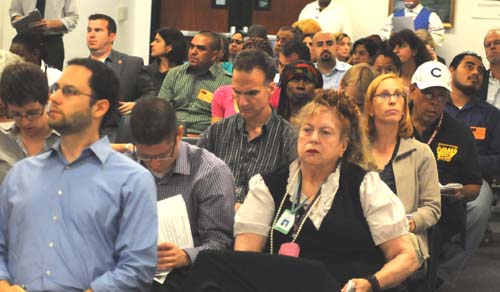 Even though a large number of reporters (including some in the photo above) covered the Board meeting (and some of those had also attended at least one of the budget hearings) none of the corporate media in Chicago criticized the refusal of CPS to publish the Proposed Budget prior to the hearings, or note the fact that the members of the Board (except for Rodrigo Sierra) ignored the hearings and were not provided with copies of the hearing transcripts to review before they voted to approve the $5.9 billion budget (capital and operations) and the property tax increase include in it. Substance photo by George N. Schmidt.He said total salary increases have increased despite the decline in teaching positions because of enrollment declines; the addition of charter schools and salary expenses also have increased despite the multi-year decline in non-teaching positions. He added that the Civic Federation was worried about the long-term view. Board members asked questions about and expressed concerns about charter schools, pension issues, and under-utilization of excess facilities. At one point, it was indicated that it was not known for sure where some budgeted money was being spent.
Even though a large number of reporters (including some in the photo above) covered the Board meeting (and some of those had also attended at least one of the budget hearings) none of the corporate media in Chicago criticized the refusal of CPS to publish the Proposed Budget prior to the hearings, or note the fact that the members of the Board (except for Rodrigo Sierra) ignored the hearings and were not provided with copies of the hearing transcripts to review before they voted to approve the $5.9 billion budget (capital and operations) and the property tax increase include in it. Substance photo by George N. Schmidt.He said total salary increases have increased despite the decline in teaching positions because of enrollment declines; the addition of charter schools and salary expenses also have increased despite the multi-year decline in non-teaching positions. He added that the Civic Federation was worried about the long-term view. Board members asked questions about and expressed concerns about charter schools, pension issues, and under-utilization of excess facilities. At one point, it was indicated that it was not known for sure where some budgeted money was being spent.
Public participation began after these staff presentations.
Karen Lewis, Chicago Teachers Union (CTU) President expressed concerns about a number of things: the policy of cleaning rooms where no one is there, individual schools that are holding over discretionary funds (She thinks that is illegal and wants the General Counsel to address that at some point), and the budget hearings where hundreds now turned out on August 10, 11 and 12. 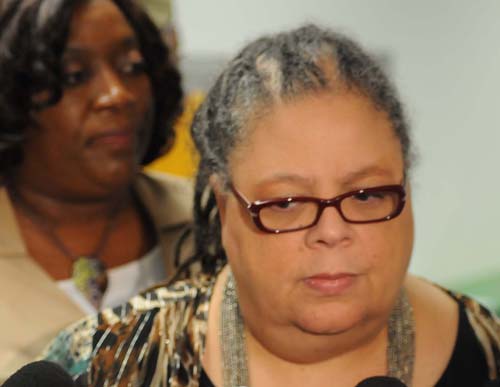 Chicago Teachers Union President Karen Lewis spoke to reporters after her latest attempt to be cooperative with the Board of Education was ignored during her remarks at the August 24 Board meeting. Lewis told reporters that the union didn't believe the Board's claim that it couldn't afford to pay the contractual four percent raise for union workers in CPS, and that Jean Claude Brizard's use of a television show (the "Chicago Tonight" show on WBEZ on August 23) to make what Brizard called an "offer" for a longer elementary school day was offensive. Substance photo by George N. Schmidt.Continuing her plea that the Board stop its policy of confrontation and adopt some attempt at cooperation, Lewis added that when we work together we can make a huge difference. She admonished the Board that "maybe one of you could say no to the budget instead of unanimously always voting yes on what is proposed." She asked them to change the process and stressed the importance of listening to the public.
Chicago Teachers Union President Karen Lewis spoke to reporters after her latest attempt to be cooperative with the Board of Education was ignored during her remarks at the August 24 Board meeting. Lewis told reporters that the union didn't believe the Board's claim that it couldn't afford to pay the contractual four percent raise for union workers in CPS, and that Jean Claude Brizard's use of a television show (the "Chicago Tonight" show on WBEZ on August 23) to make what Brizard called an "offer" for a longer elementary school day was offensive. Substance photo by George N. Schmidt.Continuing her plea that the Board stop its policy of confrontation and adopt some attempt at cooperation, Lewis added that when we work together we can make a huge difference. She admonished the Board that "maybe one of you could say no to the budget instead of unanimously always voting yes on what is proposed." She asked them to change the process and stressed the importance of listening to the public.
Michael Brunson, a parent of two CPS students, a teacher, and currently Recording-Secretary of the CTU, welcomed the Board and told them this was his first time speaking to the new Board. He advised them to "do it well or not at all." He told them his grand-daddy said "just because you pour syrup on something doesn't mean it's pancakes." He expressed the view that the figures are wrong in your budget, the budget doesn't correspond to reality, and it's as much of a budget "as teeth on a hen or feathers on a bull." He asked the Board to not approve of this budget today and to meet with our (CTU) budget team. He added that "we are working on a Shakespearean tragedy here today and if we don't get it together, it's going to be a curse on both our houses."
Okema Lewis, a Title l Community Resident and a vendor, addressed an issue she thought was resolved. She told the Board that the Principal is now the gatekeeper for federal funds, advised the Board that they had a copy of the workshops she had been providing and said, "I have been told I will not be able to provide these services." She concluded "I am providing services and I expect to be paid."
Claire Falk, a lifelong resident of Chicago, with thirty-two years in private industry and then a teacher on the West Side, told the Board that each week we teachers are putting in ten to twenty hours (outside of face-time in the School) and spending money out of our own pockets. Like many other teachers, Falk said that she is becoming resentful when CPS tries to portray teachers' work day as "too short." Addressing the Board's claim that it didn't have enough money to fund teacher and other worker raises, she said Tax Increment Financing (TIF) moneys are given to governments for communities that need assistance. Instead funds were given to a North-Clybourn Car Dealer and the Board of Trade. She said TIF funds should be coming to CPS.
Cheyenne Sims, who was a Senior at Austin Polytechnical Academy, said the former principal recently fired teachers and staff, thereby affecting the stability of the school. She is now ready for college because of the teachers who were subsequently fired. She added that the firings are an injustice to us all; the teachers were not given a chance to correct whatever they did wrong.
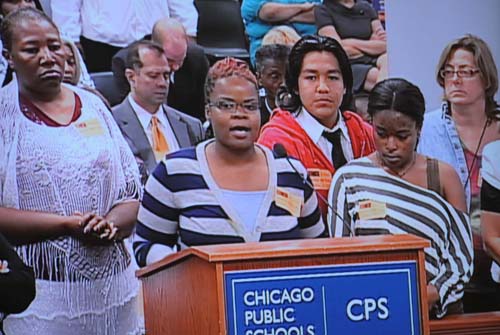 Flanked by students, teachers and parents from Austin Polytech High School, teacher Kimberly Jones (above at podium) told the Board that she had taught in China and Africa before joining CPS, and that her experiences with the former Austin principal (who terminated her and put her on the DO NOT HIRE list) has made her reconsider her attempt to teach in Chicago's neediest communities. Although Board President David Vitale told the audience the Board is investigating the misuse of DO NOT HIRE, Austin opens in September 2011 the victim of its former principal's vindictiveness. Substance photo by George N. Schmidt.Board President David Vitale said they were looking into this situation.
Flanked by students, teachers and parents from Austin Polytech High School, teacher Kimberly Jones (above at podium) told the Board that she had taught in China and Africa before joining CPS, and that her experiences with the former Austin principal (who terminated her and put her on the DO NOT HIRE list) has made her reconsider her attempt to teach in Chicago's neediest communities. Although Board President David Vitale told the audience the Board is investigating the misuse of DO NOT HIRE, Austin opens in September 2011 the victim of its former principal's vindictiveness. Substance photo by George N. Schmidt.Board President David Vitale said they were looking into this situation.
Cuauhtemoc Mendoza, a Senior at Austin Polytechnical Academy, added that the teachers have shown us what true learning is. He added to what his colleague had said about the disruption at Austin Polytechnic and the need for stability in the lives of students.
Former Austin teacher Kimberly Jones, who is on the Do Not Hire (DNH) List, said she taught in China and Africa, but it was most difficult to teach here at CPS. She pointed out the the DNH label is the principal's opinion of performance. She asked how are we going to lead the nation when we black-list good teachers. She added that this is an example of abusive power. She asked for a reevaluation of the DNH policy.
Board President Vitale said that since the last Board meeting, the Board has been looking for DNH policy changes and addressing them.
Norine Gutekanst, who identified herself as a teacher, asked the Board not to approve this budget. She reminded the Board of revenue sources and TIF funds that are being siphoned away. She cited sources of improvement in the budget. She said, "You have called for shared sacrifice, but the sacrifice has been one-sided." She added that if there was political will, we could balance the budget. She asked, "How about student-centered educational priorities?"
Josefina Castillo, Political Action Committee (PAC) Secretary at Curie High School, spoke in Spanish. In translation, she said that Okema Lewis ran meetings and gave wrong information to parents. She said the vendor is offering services and manipulating and causing conflicts.
Board President Vitale told her a Board staff member will work with you on this issue.
Pamela Touras, a CPS teacher told President Vitale, a former leader of the Academy for Urban School Leadership (AUSL) if he would consider opening up Performance Schools, where all teachers must be certified, in lieu of charter schools?
Angela Davis-Lewis, an author, spoke of All 4 Kidz Enterpises and monority publishing contractors. She said she was the first minority female provider for the CPS schools. She expressed hope that this Board will give her the opportunity to share with CPS. She and her husband, a retired CPS principal, now have a business selling children's books and said they hope to become CPS vendors. David Vitale said that the Board had a program for minority and women vendors that was highly regarded.
Board Member Jesse H. Ruiz told her this will not be discussed in closed session. He said it's not allowed under the "Open Meetings Act."
Board President Vitale told her that we have a process for purchasing that has worked well for all vendors and you must work within the process.
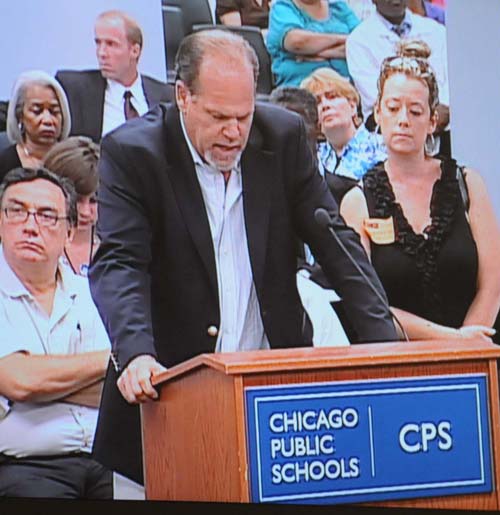 Whitney Young High School teacher Jay Rehak (above) asked the Board to get a CPS official or Board member on the TIF commission. Substance photo by George N. Schmidt. Jay Rehak, who introduced himself as a parent, taxpayer and teacher, spoke of the loss of the 4 ercent raise to teachers and other personnel. He told the Board that the money would have been spent locally and added that here's how to make that opportunity happen. He said dollars are being diverted away from the schools and we have a loss of taxation due to a lack of representation. He asked for a Board representative or a teacher on the Planning Commission who will advocate to the mayor. He said he will wait for an answer and offered to be such a representative.
Whitney Young High School teacher Jay Rehak (above) asked the Board to get a CPS official or Board member on the TIF commission. Substance photo by George N. Schmidt. Jay Rehak, who introduced himself as a parent, taxpayer and teacher, spoke of the loss of the 4 ercent raise to teachers and other personnel. He told the Board that the money would have been spent locally and added that here's how to make that opportunity happen. He said dollars are being diverted away from the schools and we have a loss of taxation due to a lack of representation. He asked for a Board representative or a teacher on the Planning Commission who will advocate to the mayor. He said he will wait for an answer and offered to be such a representative.
Board President Vitale said he would mention this to the mayor.
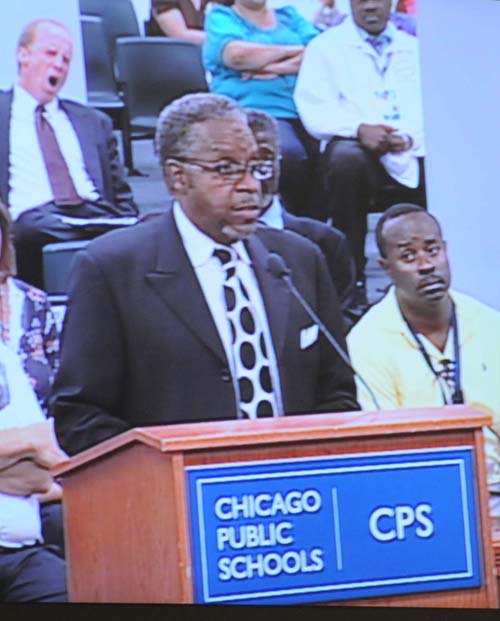 Marrion Johnson, who earlier had helped lead the protests outside CPS for the longer school day, spoke on behalf of lengthening the school day during the meeting. Substance photo by George N. Schmidt.Marrion Johnson of the Faith Community Church, spoke in support of a longer school day ( ninety minutes more) and a longer school year (two weeks). He said this needs to begin right now and it is the best option for our children. He asked the Board to approve this and added that this will keep kids off the streets.
Marrion Johnson, who earlier had helped lead the protests outside CPS for the longer school day, spoke on behalf of lengthening the school day during the meeting. Substance photo by George N. Schmidt.Marrion Johnson of the Faith Community Church, spoke in support of a longer school day ( ninety minutes more) and a longer school year (two weeks). He said this needs to begin right now and it is the best option for our children. He asked the Board to approve this and added that this will keep kids off the streets.
Jeanette Farmer spoke in support of a longer school day. She said we will have better after-school programs and the parents will be assured that the children will be safe.
Sheri Lucas, of Beasley Elementary, asked "What's the best way to produce the best outcomes? She asked the Board to extend instructional time in the classroom. She told the Board this has been echoed this morning. It would secure better students, better adults, and a better society.
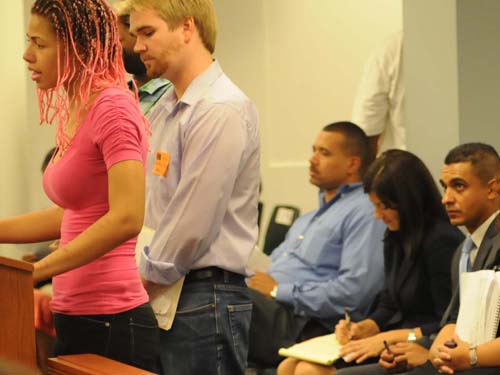 Recent Orr High School graduate Britanny Cannon (above), who is now working with the community organization "Blocks Together", told the Board that the "Restorative Justice" program that the Board supposedly supports in the Student Code of Conduct (recently revised and approved) was not being followed in every school. She said that this increases the dropout rate. Substance photo by George N. Schmidt.Brittany Cannon, who graduated in June and is a leader of Blocks Together and the High Hopes Coalition, thanked CEO Brizard and CPS for the Restorative Justice Program. She told the Board that funding of cameras, etc., means less money for the Restorative Justice Program.
Recent Orr High School graduate Britanny Cannon (above), who is now working with the community organization "Blocks Together", told the Board that the "Restorative Justice" program that the Board supposedly supports in the Student Code of Conduct (recently revised and approved) was not being followed in every school. She said that this increases the dropout rate. Substance photo by George N. Schmidt.Brittany Cannon, who graduated in June and is a leader of Blocks Together and the High Hopes Coalition, thanked CEO Brizard and CPS for the Restorative Justice Program. She told the Board that funding of cameras, etc., means less money for the Restorative Justice Program.
Luis Carrizales, of the group concerned with Healing Over the Punishment of Expulsions and Suspensions (HOPES) and the High Hopes Campaign, spoke of the Restorative Justice issue. He said many people we are working with should not be in our program; they should be in school. He added that we believe that the current CPS zero-tolerance policies increase the security budget.
Andrew Broy, of the Illinois Network of Charter Schools, expressed concern that charter schools that were cut last year were not restored this year. He said this compromises the ability to attract and keep good teachers. He added that Chicago charter schools are given the lowest charter school payment of the five largest districts in the nation.
Katie Konieczny, the principal at Oscar Mayer Magnet School, said that the Blue Ribbon Commission had decided that teachers in magnet schools not be allowed to send their own children to that magnet school. She added that we can no longer use principal discretion to allow teachers to have their own children attend the same magnet school where they teach. She said that my own son sits on our waiting list and the child of the staff member to my right, too. She asked the Board to vote No on this planned policy and to please consider this.
Valentina O'Connor, who is of Romanian heritage, said she had been in education in Washington, Wisconsin and a Chicago Alternative School. She spent eighteen years at CPS. She told the Board she was here because of a warning resolution given to her on Feburary 25, this year. She said she has taught Special Education and bilingual students and received $11,000 a year in her very first teaching salary.
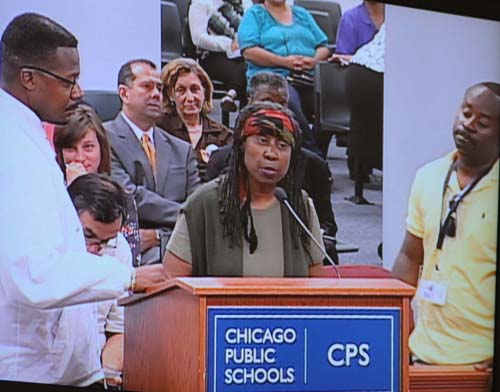 A regular at Board meetings, EvAngel YHWHnewBN demanded that Board President David Vitale apologize to her for having security move her from the podium at a previous Board meeting. She was asked to move from the podium again by security staff (above) at the August 24 meeting after Vitale thanked her for her comments but did not apologize to her. Substance photo by George N. Schmidt.EvAngel YHWHnewBN once again reminded everyone to "kick the k word." She said a kid is an animal, a beast. A child is a human being. She asked for an apology from President Vitale for what happened at Board meetings in June. She said she has the transcripts where she asked, "If I speak at this meeting (June 15th), will I be barred from speaking at the next meeting," and was told no. She told President Vitale "You were wrong, Mr. President." She added, "I think you should apoligize when you're wrong. Thank you for your statement. So, you're not going to apologize, " as security guards hovered around, one with his hand on the mic.
A regular at Board meetings, EvAngel YHWHnewBN demanded that Board President David Vitale apologize to her for having security move her from the podium at a previous Board meeting. She was asked to move from the podium again by security staff (above) at the August 24 meeting after Vitale thanked her for her comments but did not apologize to her. Substance photo by George N. Schmidt.EvAngel YHWHnewBN once again reminded everyone to "kick the k word." She said a kid is an animal, a beast. A child is a human being. She asked for an apology from President Vitale for what happened at Board meetings in June. She said she has the transcripts where she asked, "If I speak at this meeting (June 15th), will I be barred from speaking at the next meeting," and was told no. She told President Vitale "You were wrong, Mr. President." She added, "I think you should apoligize when you're wrong. Thank you for your statement. So, you're not going to apologize, " as security guards hovered around, one with his hand on the mic.
Chief Counsel Patrick Rocks told her, "I would like to try to answer your question in a letter to you regarding African-American students and the Dream Act."
She replied, "I look forward to that letter and thank you."
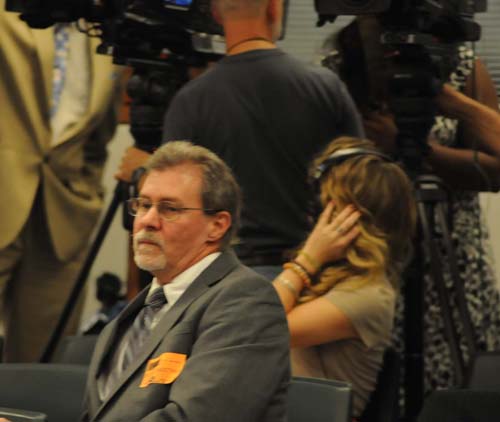 Rod Estvan, who does budget analysis for Access Living Chicago, waited more than four hours before he was able to speak to the Board on August 24 on the concerns of people from the disability rights community with the Proposed Buddget. Substance photo by George N. Schmidt.Rod Estvan, of Access Living of Chicago, spoke of the Fiscal Year 2012 budget. He said neighbors had said to him, "You have the biggest house on the block and you're asking for a tax increase!" He said he didn't agree with the retroactive funding for the Police Department. He said our Special Education system is not working; cross-certified teachers can do this work. He said he was a lobbyist and the Illinois State Board of Education (ISBE) took our comments seriously.
Rod Estvan, who does budget analysis for Access Living Chicago, waited more than four hours before he was able to speak to the Board on August 24 on the concerns of people from the disability rights community with the Proposed Buddget. Substance photo by George N. Schmidt.Rod Estvan, of Access Living of Chicago, spoke of the Fiscal Year 2012 budget. He said neighbors had said to him, "You have the biggest house on the block and you're asking for a tax increase!" He said he didn't agree with the retroactive funding for the Police Department. He said our Special Education system is not working; cross-certified teachers can do this work. He said he was a lobbyist and the Illinois State Board of Education (ISBE) took our comments seriously.
Jose F. Hernandez, of Calmeca Academy, supports full-day kindergarten. He said a full day was the key to success at Calmeca. He asked the Board to keep Calmeca in mind for an all day kindergarten.
Board President Vitale told him that this budget proposes investing in all-day kindergarten.
Geraldine Baginski welcomed CEO Brizard in French. She was a teacher representative on the Local School Council (LSC) at Schurz High School in the 90s, when Schurz went from three assistant principals to six. She said she voted no on their budget because they had a lower enrollment and the money was not going into the classroom. She added that no teacher should pay for copies at Kinko's. She said money was being diverted to other purposes than helping our students and teachers in the classroom. She spoke of the property tax increase and said she heard at the CTU Retirees' meeting on Monday that six hundred million dollars was owed to the Chicago Teachers Pension Fund (CTPF) in 2014.
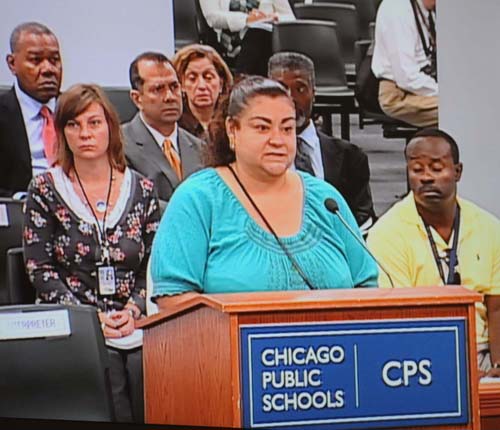 Milagros Roman speaking to the Board. Substance photo by George N. Schmidt.Milagros A. Roman, of SEIU, spoke of janitor layoffs and said two hundred had been cut already. She told of cleaning both inside as well as outside the school. The Board was reminded that big corporations have money already, money that's needed for the kids, adding "I don't want my children in a dirty classroom."
Milagros Roman speaking to the Board. Substance photo by George N. Schmidt.Milagros A. Roman, of SEIU, spoke of janitor layoffs and said two hundred had been cut already. She told of cleaning both inside as well as outside the school. The Board was reminded that big corporations have money already, money that's needed for the kids, adding "I don't want my children in a dirty classroom."
Ronald Jackson, of Tilden High School, said he was here the month before last. He told how his daughter was treated and added that the legal document regarding this was not in his daughter's file. He asked why his daughter was not in summer school and now has to repeat school again. He said he told the case manager, you're her case manager; you know she didn't graduate.
Mr. Jackson said that eight high schools are without computer technology and Tilden was one of them. He asked CEO Brizard, "What are you going to do today for these children for their future?" He asked, "Can we get this started at Tilden? Can we meet with the principal of Tilden?"
Rosita Chatonda, the founder of Chicago Alliance of Urban School Educators (C.A.U.S.E.), spoke of the impact of Ren 2010 on the African-American community. In regard to House Bill, H.B. 1547, she requested that the Board "become active in righting injustices in our community." She added that we have lost 5,000 teachers, through E3s, firings, phase-outs and closings. She asked that the Freedom of Information Act (FOIA) provide the numbers of teachers fired by race. She said we also lost 38,000 students, some by expulsion, and added, "Our community is really suffering."
George Schmidt, who writes for Substance Newspaper, said we don't pretend to be objective; we promise to be accurate. He asked the Board to vote against the new budget because accurate information was not being presented. He mentioned that on August 5, copies of the budget were available on-line, not in hand, for the first time in history. 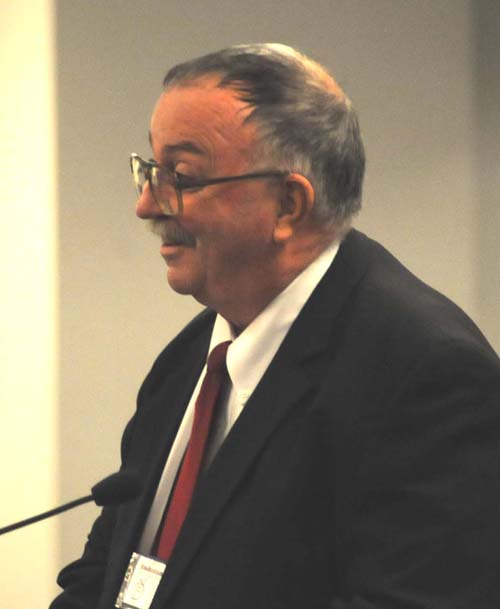 Substance reporter George N. Schmidt told the Board that it should vote "No" on the proposed budget because CPS had failed, for the first time in more than 150 years, to provide copies of the budget to citizens prior to the August hearings. Substance photo by David Stone.He said he read all 2,000 pages which he printed out. He said the new budget doubled the number of teachers and students and was then revised August 11. He saved the August 5th document. He emphasized that what you're spending on each school is key. He added that he spoke at the August 10th and 11th budget hearings. He said the public needs to a "buy-in" here. He asked the Board to defer the budget and bring it back later. He said, "Do it the way the State Board did, (as Rod Estvan said)." He warned that parodies and satires will follow if you don't do that. He said the August 5th budget claimed 700,000 students. He exhorted the Board, "Don't approve this budget."
Substance reporter George N. Schmidt told the Board that it should vote "No" on the proposed budget because CPS had failed, for the first time in more than 150 years, to provide copies of the budget to citizens prior to the August hearings. Substance photo by David Stone.He said he read all 2,000 pages which he printed out. He said the new budget doubled the number of teachers and students and was then revised August 11. He saved the August 5th document. He emphasized that what you're spending on each school is key. He added that he spoke at the August 10th and 11th budget hearings. He said the public needs to a "buy-in" here. He asked the Board to defer the budget and bring it back later. He said, "Do it the way the State Board did, (as Rod Estvan said)." He warned that parodies and satires will follow if you don't do that. He said the August 5th budget claimed 700,000 students. He exhorted the Board, "Don't approve this budget."
The last speaker was Kim Brown who wants her son to be allowed re-entry at Simeon Career Academy and told the Board, " I need my son to be in school on September 6th."
Board President Vitale directed a staff member to work with Ms. Brown.
At this point, public participation ended and the Board went into closed session.
[A report on what took place after the Board returned from Executive Session appears elsewhere on this Substance home page].

